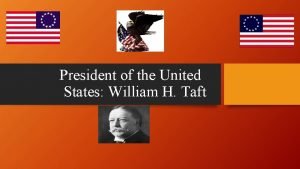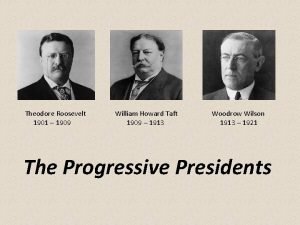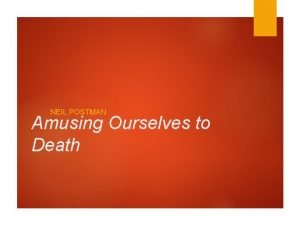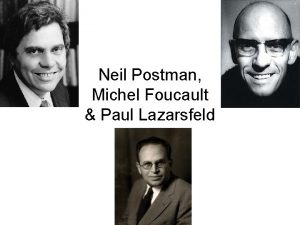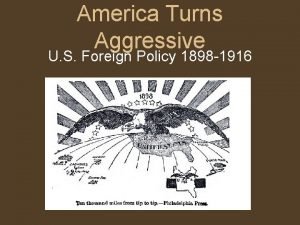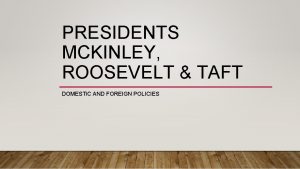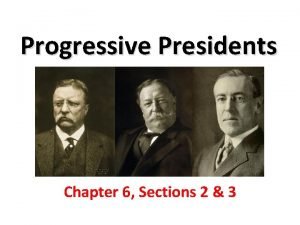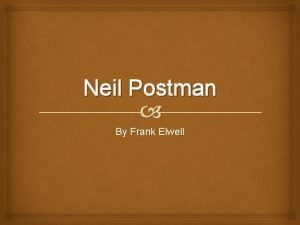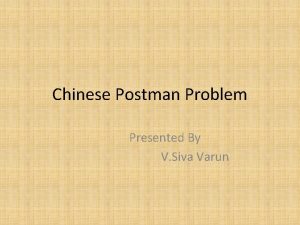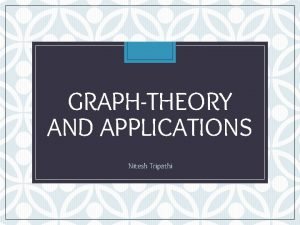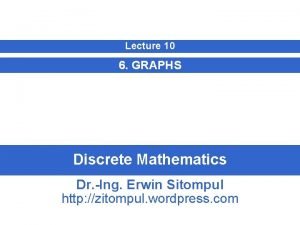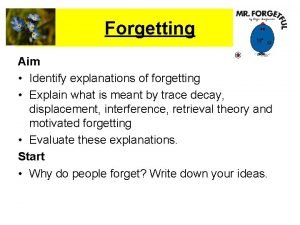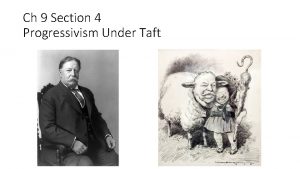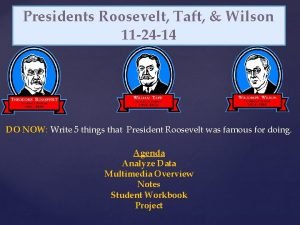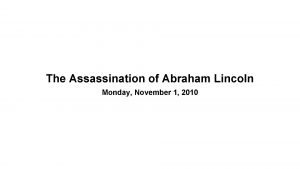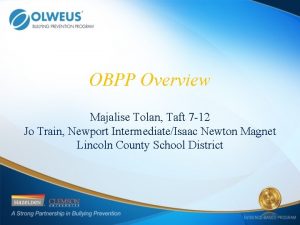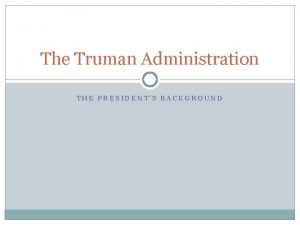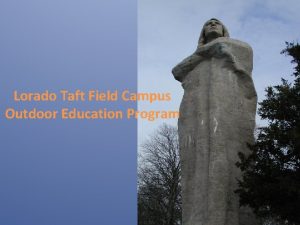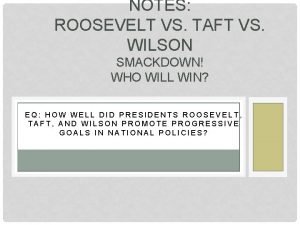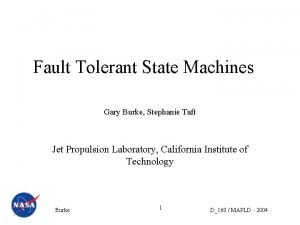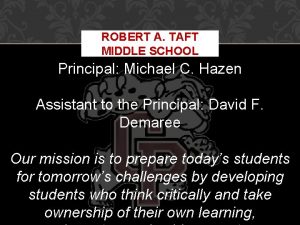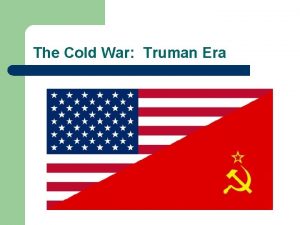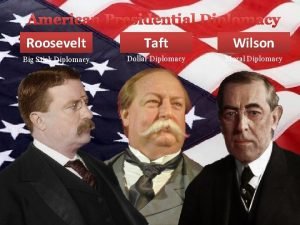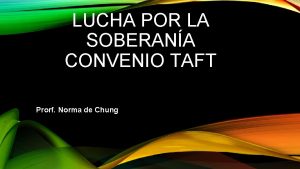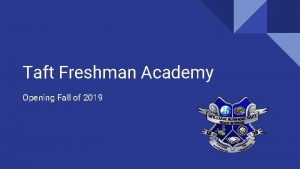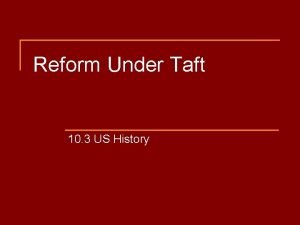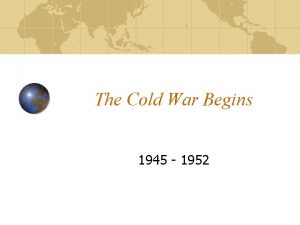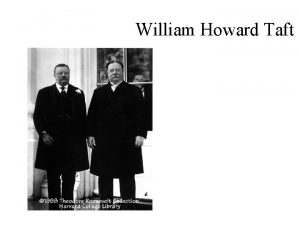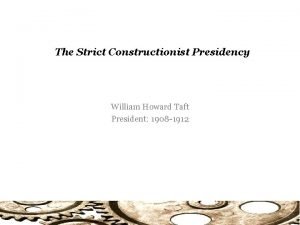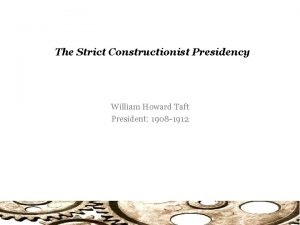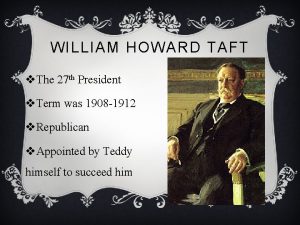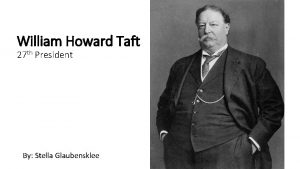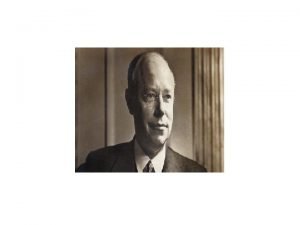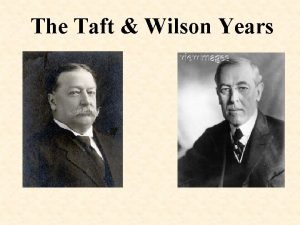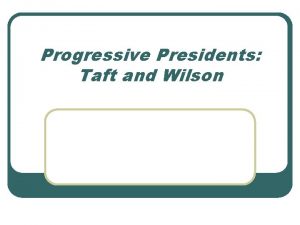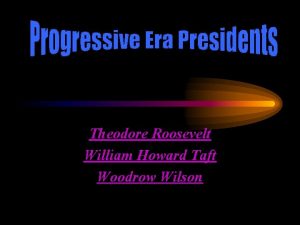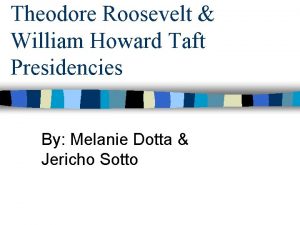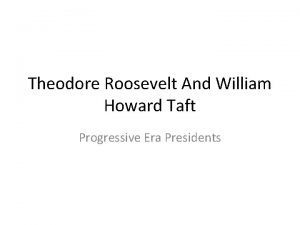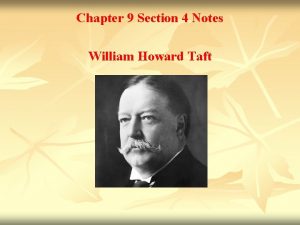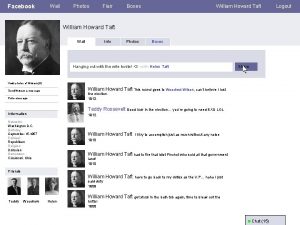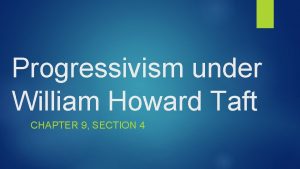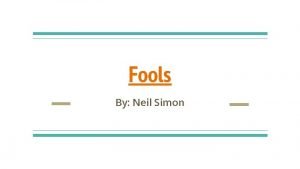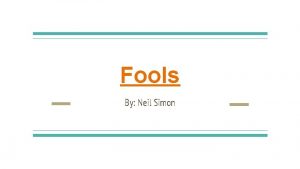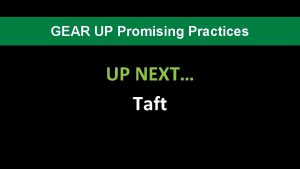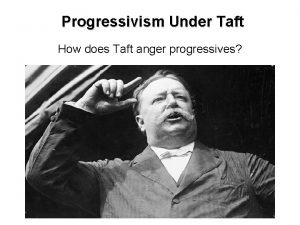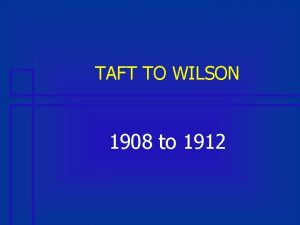William Howard Taft 27 th President Neil Postman
































- Slides: 32

William Howard Taft (27 th President) Neil Postman questions whether a 300 pound man could be president today

Television Gives us a conversation in images and not words

The news of the day Comes from the telegraph And is continued through the news media Made it possible to move decontextualized information across vast distances Without a medium to create its form, the news of the day does not exist Aligns with Marshall Mc. Luhan in this instance Postman agrees that the clearest way to see through a culture is to look at its tools of conversation William Fothergill Cooke and Charles Wheatstone's electric telegraph ("needle telegraph") from 1837

Metaphor • • Suggests what a thing is like by comparing it to something else Now metaphors are far more complex Symbolism as communication rather than critical thinking Postman associates linear thinking in reading with critical thinking

Medium vs. Metaphor • Message: denotes a specific, concrete statement about the world • Our current forms of media, including the symbols through which they permit conversation, do not make such statements. • They are more like metaphors, working by unobtrusive but powerful implication to enforce their special definitions of reality • Metaphor for American=Sizzler promotional video

Media and Truth • There is no one way to know truth • A civilization’s media will determine that culture’s understanding of truth • Primitive oral cultures will value someone who has the ability to remember proverbs • A written culture may find proverbs quaint and value written word as the way to truth

• “Truth, like time itself, is a product of a conversation man has with himself about and through the techniques of communication he has invented. ” • “Some ways of truth-telling are better than others, and therefore have a healthier influence on the cultures that adopt them. ”

TV • Postman speaks highly of TV as a form of entertainment • His concern is that entertainment has become a dominant form of communication • Television influences: politics, education, religion, and journalism

Typographic Mind Colonial-mid nineteenth century Early Americans were a literate culture Written word is rational discourse A written argument provides, exposition and makes points that are explained • The reader makes a judgment about whether the statements are true or false (based on supporting evidence) • •

The Telegraph and the News of the Day • “Peek a boo world” • The telegraph (and later forms of media) bring instantaneous information that was no longer limited by geographic distance • Society became less driven by the understanding of context • The news of the day brings us irrelevant information divorced from its context. • The deliberate process of rational discourse began to break down

Serial: The Alibi (Exposition) • Jay recounts the entire day of the murder • the entire case hinges on just 21 minutes • the window of time in which Hae is killed • About those 21 minutes, precious little is known. • "The Alibi, " lays out the day of the murder and Adnan's alibi that would clear him of killing Hae.

As a crime reporter or a lawyer • • • Question the truth of Jay’s statement Find out reasons why Jay would lie Point to moments in his testimony when he has implicated himself in a large crime Have the detectives been involved in other cases where false testimonies have been made? Interview many people about the timeline Jay gives Point to the many times Jay changes his story

To write a crime story • You introduce intriguing characters • You delay the listeners access to information • You introduce information that makes a central character look either guilty or innocent (in Serial —week to week wavering from one to the other) forcing the audience to make hypotheses

What is the exposition setting the listener up for? • • The groundwork for finding the truth? The groundwork for a good story?

The groundwork for a good story • Did Serial start the story by investigating Jay and why he would give that testimony? • Past trouble with the law? • Reward money? • How the investigators get him to cop to accessory (punishable by the death penalty) • Did Serial look at how the investigators focused primarily on Adnan?

They were not building the foundation for finding the truth • Serial sets up an amazing structure where each week we have certain aspects of the case revealed that lead us to question either Adnan or Jay • The story she is following, is the story of the investigators and the prosecution • That story is slanted and flawed • It is incomplete

Arousing Suspicion • Sarah gives the listener her story of being conflicted between the state’s (incomplete and flawed) investigation and her perception of Adnan

Humanization of the Invisible • In traditional crime stories characters like Adnan are not so richly humanized • This is the most truthful aspect to the Serial Podcast

The Thin Blue Line (1988) • Documentary about the arrest and conviction of Randall Adams for the murder of a Dallas Policeman in 1976

Documentary • A documentary film is, at its heart, a document. The word comes from the Latin docere, to teach.

• In aiming to inform, teach or persuade, the documentarian can be a recorder of history, a political activist, an observer of humanity, or a visual poet.

• In his search to uncover the facts in the case of a convicted murderer, Morris seeks not only to reveal the truth but also to right a wrong, becoming, in essence, a self-proclaimed investigator and a purveyor of justice.

Reflexive • Draws attention to formal cinematic processes

Expressionistic • • • Milkshake sailing through air in slow motion Stopwatch swinging back and forth News clippings shown in microscopic close-ups Stylized Calls for the viewer to question what they are seeing and reflect on what it means

• Allows Morris to expose the institutionalized “self-deception” that led to Adams’ conviction and life sentence

Re-enactments • Errol Morris’ crime re-enactments were meant to be hypnotic and expressive • Draw attention to varying viewpoints • The style has been used in countless “truecrime” shows since

Errol Morris • Morris’ films have won many awards, including an Academy Award for Best Documentary Feature, an Emmy, the Grand Jury Prize at Sundance Film Festival, the Silver Bear at Berlin International Film Festival, the Golden Horse at the Taiwan International Film Festival and the Edgar from the Mystery Writers of America. • The Tin Blue Line is one of the most acclaimed documentaries ever made

Errol Morris He is a graduate of the University of Wisconsin. Madison and was a graduate student at Princeton University and the University of California-Berkeley. Went to a variety of graduate school programs, and after attending Berkeley for some time became a regular at the Pacific Film Archives

• Made two features (narratives) before making The Thin Blue Line • Morris was interested in Dr. James Grigson, a psychiatrist in Dallas. • Met Randall Dale Adams (was unconvinced of his innocence) • Not sure after reading transcripts and meeting David Harris

• At the time Morris was a private detective • Put together his skills with his interest in film • His un-edited interviews were used in Adams’ appeal hearing • Prosecution witnesses’ contradictions

“Two Films Grafted Together” • Simplest terms: “Did he do it or not? ” • The film is also an essay on false history • A group of people, literally everyone, believed a version of the world that was entirely wrong. • His accidental investigation of the story provided a different version of what happened

• Give an example of the film being reflexive • Give an example of the film being expressionist • How did your understanding of truth shift throughout the film?
 Ducksters
Ducksters 1858 william howard taft rd
1858 william howard taft rd Neil postman
Neil postman Postman undo changes
Postman undo changes Neil postman
Neil postman President taft’s foreign policy emphasized
President taft’s foreign policy emphasized William h taft domestic policy
William h taft domestic policy President vice president treasurer secretary
President vice president treasurer secretary 3 progressive presidents
3 progressive presidents All in the valley of death rode the 600
All in the valley of death rode the 600 What belief does postman hold about television
What belief does postman hold about television Chinese postman problem
Chinese postman problem Connector problem in graph theory
Connector problem in graph theory Colored in
Colored in Underwood and postman 1960
Underwood and postman 1960 Predicate and predicator
Predicate and predicator Chapter 9 section 4 progressivism under taft
Chapter 9 section 4 progressivism under taft Roosevelt vs taft progressivism venn diagram
Roosevelt vs taft progressivism venn diagram The assassination of
The assassination of Taft 7-12
Taft 7-12 Pp&e turnover ratio
Pp&e turnover ratio Taft-hartley act
Taft-hartley act Lorado taft camp
Lorado taft camp Wilson vs roosevelt
Wilson vs roosevelt Stephanie taft
Stephanie taft Taft hartley act apush
Taft hartley act apush Taft middle school principal
Taft middle school principal Taft-hartley act
Taft-hartley act Moral diplomacy
Moral diplomacy Convenio taft de 1904
Convenio taft de 1904 Taft freshman academy
Taft freshman academy Mann elkin act
Mann elkin act Taft-hartley act
Taft-hartley act
